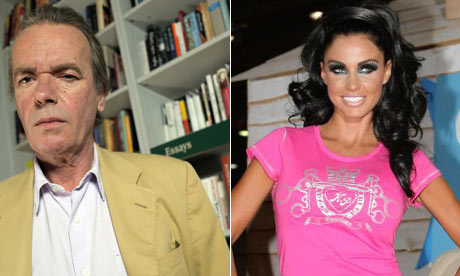
It's always a little bit astonishing in these relatively enlightened times when someone who would like to be regarded as an important contributor to the cultural agenda relies on lazy, casual misogyny to attempt a critique. But it's the approach that Martin Amis has taken in adding his thoughts to the current (somewhat tired) debate about celebrity writers creaming off the profits of talented ones, when he remarked of Katie Price (widely recognised as his key literary rival) that "She has no waist, no arse ... an interesting face ... but all we are really worshipping is two bags of silicone."
Now, I doubt that Amis has flickered across Price's radar; nor, if he has, that she cares much about his opinion since it would appear that she is currently preoccupied with her romance with her cage-fighting boyfriend and not much with writing books, which she employs someone to do on her behalf. But while Price may not be troubled by Amis's remarks on a personal level, I am: because they speak to the continued endurance of a surprising tolerance for misogyny from vaunted men of letters who came of age as writers in an era when the loathing of women for being women – rather than for being crap writers, or unkind people, or whatever – was still legitimate.
It may be diverting for Amis to imagine that legions of his would-be readers have been distracted from his work by Katie Price's cleavage: perhaps he thinks at the sight of her latest pony book, people on the verge of purchasing The Rachel Papers or London Fields think, "ooh! Breasts!" and toss his work aside. But this apparent anxiety is misplaced: Amis and Price's target markets do not intersect. It is risible to suggest that they do, but no matter: it's much easier, and simpler, for him to blame her décolletage for his decreasing sales and critical acclaim than to entertain the terrifying thought that his writing may no longer be quite as firmly on the pulse as it once was.
When writers like Amis, or Philip Roth – who declared this week that novel-reading would be a fringe activity in 25 years – make their apocalyptic proclamations about the state of publishing, it seems apparent that their pessimism may in fact be rather strongly influenced by anxiety that their new work no longer carries the kind of cultural clout they have grown used to, not because people aren't reading novels, but because people aren't reading their novels. And part of the reason for that may be that with the bulk of modern consumers of fiction being women, the particular brand of literary writing in which a particular aptitude for fellatio suffices as characterisation for a woman is less interesting, or resonant, than it once was.
I very much doubt that Amis is going to change at this stage – I do admire some of his immense skills as a writer, but remarks like this underscore my lack of interest in him as a cultural commentator. But I'm heartened, at the same time, by a new generation of male writers – David Vann and Joshua Ferris are two who I've recently read who come to mind – who are producing ground-breaking work that addresses issues of masculinity in fresh ways without relying on lazy misogyny; who are too busy to bother with worrying that anything that fails to preserve the long-expired literary status quo of the 70s and 80s is a sign of an apocalypse.

